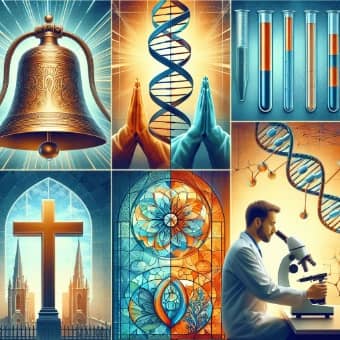The Interplay of Faith and Science
Catholic Perspectives on Evolution and Creation
The ongoing dialogue between faith and science has intrigued philosophers, theologians, and scientists for centuries. In the Catholic tradition, this discussion has taken a distinctive form, especially in relation to the theories of evolution and creation.
This article explores how Catholicism has interacted with these scientific theories and how it continues to integrate scientific discovery with religious belief.
This blog post contains affiliate links. When you click on a link on this page and make a purchase I may earn a small commission, at no additional cost to you. Thank you for your support.
Historical Context
The Catholic Church’s engagement with science can be traced back to the Middle Ages, with the establishment of universities that were deeply rooted in Catholic thought. Notable Catholic scientists, including Georges Lemaître, who proposed the Big Bang theory, have made significant contributions to our understanding of the universe.
This historical commitment to learning both God’s words and His works provides a context for the current understanding of evolution and creation.

Catholic Teaching on Creation
The Catholic Church teaches that God is the ultimate source of all life and the creator of heaven and earth. This belief is deeply embedded in the Scriptures and the Church’s doctrine. According to the Catechism of the Catholic Church, “God himself created the visible world in all its richness, diversity and order.”
The View on Evolution
Unlike some religious groups, the Catholic Church does not reject evolutionary theory. In 1950, Pope Pius XII’s encyclical Humani generis addressed the question of evolution directly, acknowledging that evolution might describe the physical processes by which the human body developed.
Later, Pope John Paul II furthered this perspective in 1996, stating that evolution is “more than a hypothesis” because it is widely supported by evidence.
Evolution and Divine Providence
Catholic teaching holds that God’s providence is not contradicted by evolutionary theory. Instead, it suggests that God works through natural laws, including those that govern biological evolution.
This view does not see God as a “watchmaker” who only set the universe in motion, but as a sustainer of all creation, actively involved and present in the processes of life.
Faith and Reason
A core tenet of Catholic thought is the compatibility of faith and reason.
Pope St. John Paul II’s encyclical Fides et Ratio (Faith and Reason) emphasizes that truth comes from both faith and reason, and therefore, scientific truths are not seen as opposing religious truths but as complementary. This encyclical underscores the belief that exploring scientific questions is an important part of understanding God’s creation.
Education and Dialogue
The Catholic Church supports the teaching of evolution in schools as a scientific theory and advocates that it should be taught alongside the theological context of Catholic beliefs about creation. This approach fosters an environment of dialogue rather than conflict and encourages students to explore the depth of both scientific and religious truths.
Challenges and Opportunities
Integrating faith with evolving scientific theories sometimes poses challenges. Debates continue within the Church about how to interpret specific elements of Scripture in light of scientific discoveries. However, these challenges also present opportunities for deeper understanding and dialogue between the scientific and religious communities.
Conclusion
The Catholic Church’s approach to evolution and creation is an excellent example of its broader view that faith and science are complementary rather than contradictory. This synergy encourages ongoing dialogue, deeper inquiry, and a more comprehensive understanding of the universe as both a scientific and a spiritual creation.
In this way, Catholics are invited to explore the mysteries of faith and the rigor of science together, leading to a richer, more holistic appreciation of truth.
